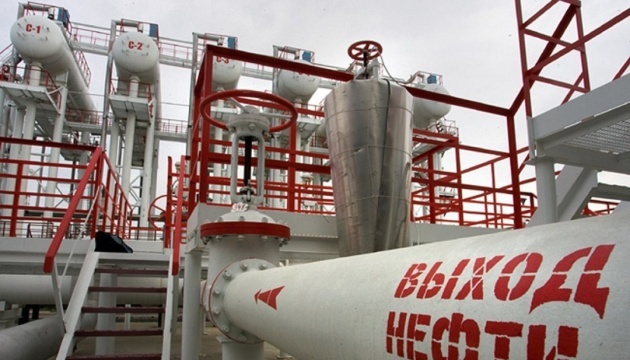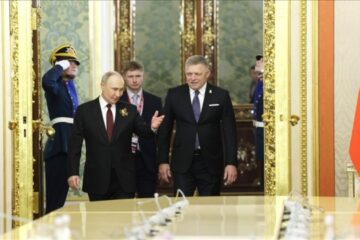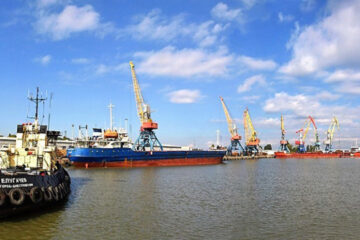
Ukraine’s recent attacks against the Druzhba oil pipeline are parts of a larger, intensive campaign against the Russian oil sector, and the resulting disruptions of supplies to Hungary and Slovakia are merely a side effect.
This was stated in an exclusive comment to Ukrinform by Andras Rasz, a Hungarian expert with a German-based DGAP think tank.
“These attacks serve at least three main purposes. First, they intend to decrease Russia’s incomes from oil export. Second, they also want to create a fuel shortage in Russia, further amplifying economic problems. Third, they also serve an information purpose: to make the Russian population aware of the war. There is no propaganda apparatus that could hide a blazing oil refinery, which is visible from dozens of kilometers and is burning for days,” Rasz said.
He noted that in recent weeks, Ukrainian drones and missiles have hit half a dozen Russian refineries and storage facilities, as well as sections of the Druzhba pipeline. Specifically, the pipeline has been attacked three times: the pumping station at Nikolskoe got one hit, while the hub at Unecha was hit twice. The second attack stopped the operation of the pipeline for a number of days.
“Unecha, located east of the Russia-Belarus border, is a key oil distribution hub of the Druzhba pipeline. From here goes a pipeline to the Gulf of Finland port of Ust’-Luga, from where Russia’s ‘shadow fleet’ tankers are still exporting Russian crude oil. Another pipeline leads to Belarus and supplies the two large, modern oil refineries at Mozhyr and Novopolotsk. Belarus has long played an important role in supplying Russia with refined oil products. Hence, the repeated Ukrainian attacks against the Unecha pumping station serve a double purpose: to hamper Russia’s oil export and also to decrease the amount of oil products Moscow is receiving from Belarus,” the Hungarian expert explained.
Rasz emphasized that the halt in Russian oil exports to Hungary and Slovakia due to the strikes on Druzhba is merely a side effect, not the main objective. “Had Ukraine intended to stop specifically the Russian oil supplies to these two countries, it could have done so much easier. All Ukraine would have had to do is to blow a hole to the pipeline somewhere in Western-Ukraine, place the wreckage of a Russian drone or cruise missile next to it and put the blame on Moscow. Still this never happened in the last 3,5 years,” he added.
Until recently, Ukraine was interested in maintaining stable supplies through the Druzhba pipeline. “Kyiv received approximately 200 million USD annually from the transit fee. Besides, Hungary has been an important supplier of Ukraine with electricity, natural gas and also some oil products. Hence, a certain level of interdependence prevailed,” Rasz noted.
He recalled that there were at least two previous cases where military actions indirectly affected the pipeline, temporarily halting the flow of oil. In both cases, Ukrainian, Russian, and Belarusian authorities quickly resolved the problems through coordinated technical actions, and oil supplies were resumed considering all parties’ interests.
However, according to the expert, the recent series of Ukrainian strikes on the pipeline marks a moment when military logic out takes over the business logic: “Degrading Russia’s oil sector along the motivations outlined above is more important for the Ukrainian government than maintaining the transit fee incomes.”
Rasz observes that this shift was an unwelcome surprise for the Hungarian government for two main reasons.
“First, Budapest has long overestimated the importance of the interdependence logic, thus thought that Ukraine would not risk losing the transit fee incomes. The Hungarian government probably also overestimated the leverage it has over Ukraine through the selling of electricity to Kyiv. As Ukraine reportedly pays the market price for the electricity, gas and oil products imported from Hungary, meaning that cutting these flows would also harm Budapest’s pocket,” Rasz explained.
“Second, Hungary has consistently failed to decrease her dependence on Russian crude oil supplies.”
The expert explained that the reasons are mostly linked to the fact that importing and refining Russian crude has long been extremely profitable for both the MOL Hungarian Oil and Gas Company and also for the Hungarian state budget.
“In addition, similarly to the old RosUkrEnergo scheme, there are also intermediaries in the Russia-Hungary oil trade, and owners of these intermediary companies have cashed on hundreds of billions of Hungarian Forints (at least 800 million EUR) even before the full-scale invasion,” Rasz said.
Thus, there were both state and private interests acting against diversification. “The situation of MOL was made further complicated by the fact that the Hungarian government put an extra tax on the incomes of MOL, depriving the company of most of the resources necessary for the diversification,” the expert added.
In his view, future developments will largely depend on further Ukrainian strikes on Russian oil infrastructure.
If the campaign continues, it is entirely logical from Ukraine’s perspective to continue attacks on the Druzhba pipeline, particularly on the key Unecha hub. In this case, Hungary, like Slovakia, will continue to face oil supply problems, as the country’s only refinery is owned by MOL.
“As MOL is led by serious, seasoned professionals, the company is most likely going to rapidly speed up its diversification efforts, with or without the support of the government. The first aspect is the transit routes. The most viable alternative is to use the pipeline coming from the Adriatic Sea through Croatia. Until recently MOL was reluctant to rely too much on this pipeline, concerned that JANAF may ask for much higher transit fees than the costs of the Druzhba have been. However, now, when supplies through Druzhba are becoming unpredictable, the relative value of the Croatian route is increasing,” the expert said.
Second, Rasz believes MOL will intensify investments necessary for becoming able to process also non-Russian oil, including purchasing new blending tanks and adjusting the infrastructure for different types of crude oil.
“While all these measures take time and resources, they are far from impossible. Both Czechia and Austria managed to get rid of using Russian oil, so there is no reason to believe that Hungary would be unable to do so,” he reflects.
“All in all, the attacks on the Druzhba pipeline indeed served as a wake-up call for many in Budapest. While diplomatic tensions with Ukraine will continue, as there are players on both sides that can capitalize on them, from the strategic perspective the most important thing to watch is whether and how Hungary would finally start diversifying its dependence on Russian oil supplies,” Rasz concluded.
Previously, Ukrinform reported that President Volodymyr Zelensky stated that Ukraine’s friendship with Hungary now depends on the official position of Budapest, apparently referring also to the Druzhba pipeline, which supplied energy from Russia but was halted due to the attacks.



